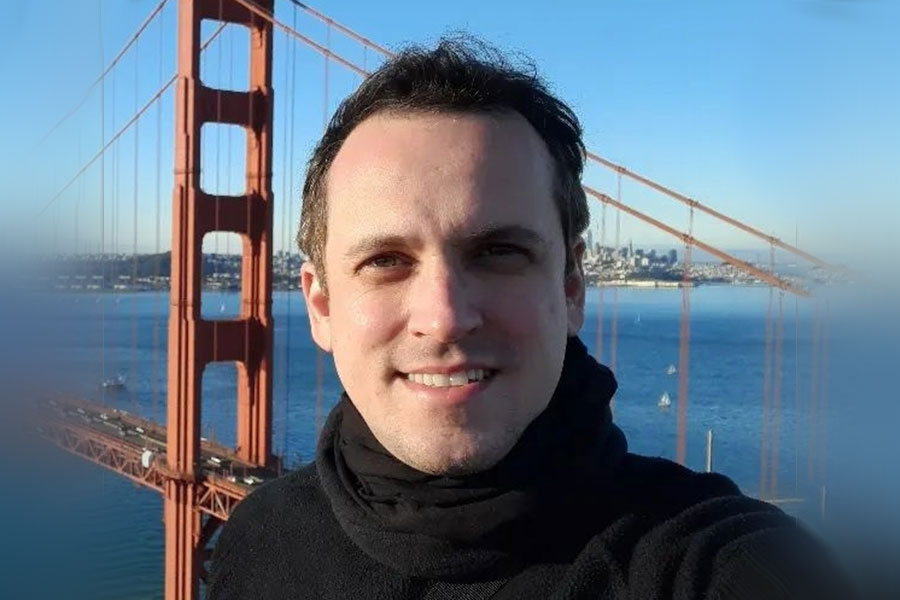Get to know Ricardo Rossi, Fermentation Scientist at Calysta
What was your first job and what did you study at University?
Life was always the most interesting puzzle to me, both scientifically and philosophically. So, when I was very young, I decided to study Biology as my BSc, followed by MSc in Biotechnology and genetics. My first job was as a fermentation analyst in a bioenergy fermentation company back in Brazil, my native country.
Describe your journey with Calysta
I started at Calysta in 2017 working in the development of our fermentation process, at the beginning of the Teesside laboratory. I participated in the start-up of new laboratories and facilities, training new staff, refining our processes and witnessing how fast we managed to make technology ready for production. Since then, my professional journey has been very diverse in activities surrounding Calysta’s fermentation technology.
Over the past two years, my role adopted a very interesting international nature, as we started our first commercial plant in Chongqing, China. With the trust I received from management and the experience I accumulated in the Teesside lab, I became confident enough to work on the technology transfer area, which I really enjoyed. However, due to the pandemic restrictions, my project started remotely, communicating to the local team to speed up the project. As soon as I got authorisation to fly, I finished my project locally, with three very intense months of Chinese cultural immersion.
Now, I’m back in Teesside but packing my bags and preparing my passport again for a new challenge. With our laboratory’s activities increasing, I was invited to join Calysta’s research lab in San Mateo, California, enhancing connections between our technology centres and experts. I’m very thankful for all the time and experiences in the UK but also very excited for sunny California and all the new experiences it will bring.
How has working in different locations across the world shaped your knowledge today?
Working in different locations across the world can be very challenging sometimes due to cultural and communication differences, but it certainly opens your mind to diversity and how to understand different points of view about common subjects. Although science is a universal language, the human connections will always be an important part of scientific work and make a significant difference.
What drew you to work at Calysta?
Joining Calysta was very exciting for me for two main reasons. Firstly, the fermentation technology which I know from experience has potential to generate business, scientific and social impact. It was a unique opportunity to learn while developing disruptive technology. And secondly, by joining the team at that time, I’ve been able to follow most of the company development cycle, starting new facilities, training new teams and being part of all these different tasks and environments that a start-up gets across.
So, I think that the possibility of following those very important development steps for the company while developing myself as a scientist in a global business was very motivating and certainly supported my decision.
What has been your biggest achievement in your career?
Bringing our process technology from laboratory to our first production plant is a remarkable achievement for myself and the wider Calysta team. I’m very glad to see it operating after all the dedication from everyone involved, thousands of miles away from home, getting over language and pandemic barriers. It feels like making science and technology combine to complete a phase and it’s been great being part of it for almost six years at Calysta.
What values do you believe are most important in your job role?
Science is a very powerful tool but sometimes it becomes inaccessible for some audiences – even more when you work with multi-cultural and/or multi-site-based teams with different languages, cultural backgrounds, and life experiences. Because of this, I believe empathy is very important to scientists in general, not only to understand other’s point of view and guarantee effective communication but also to remember the impact and the end goal of our work and the effects it could have in society.
Do you have any advice for someone aspiring to be a Fermentation Scientist?
I think being a scientist in general is a very hard pathway, even more so in today’s world, where information and knowledge are getting more complex and uncertain. My advice for someone aspiring to be a scientist in general is to remember that being a scientist today means not only to work and to study hard, but to also stand for science and to demonstrate to society how helpful knowledge can be to build a better future.
Where do you hope to see fermentation science in the next 5 years?
Biotechnology and fermentation have the potential to massively improve wellbeing in society by enhancing food quality, energy efficiency and even developing new therapeutic strategies and solutions for complicated diseases. Working in fermentation science allow us to participate in all these transformations happening from inside. I hope that the advance of robust and viable fermentation platforms could be a huge step in encouraging more investment in solving these big modern puzzles and, luckily, to see all this potential becoming more accessible to people.

